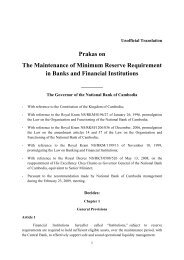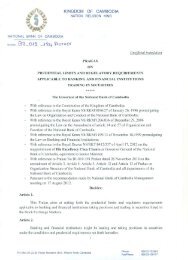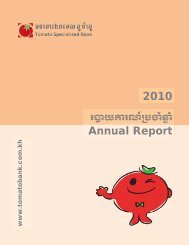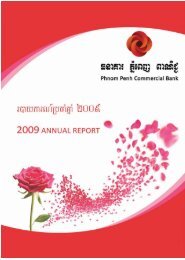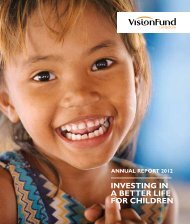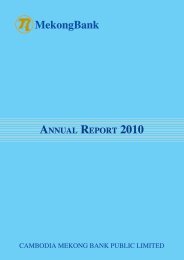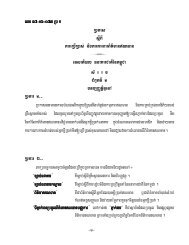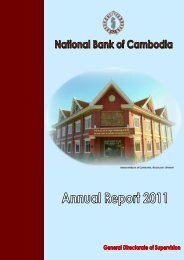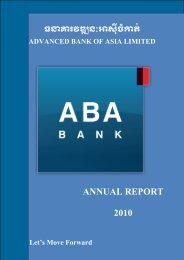National Bank of Cambodia
National Bank of Cambodia
National Bank of Cambodia
- No tags were found...
Create successful ePaper yourself
Turn your PDF publications into a flip-book with our unique Google optimized e-Paper software.
year later. In addition, given two-year government bond yields rose significantly,Greece inevitably requested for the second bailout.Being a euro area member precludes the possibility <strong>of</strong> currency devaluation asgenerally practiced by countries that receive aid from the IMF. As a result, Greece’sforeign currency earnings, which came mainly from tourism and maritimetransportation, did not increase much. Investors also questioned Greece’s ability torepay debts given the delayed fiscal consolidation.Recently, there is a proposal for involvement <strong>of</strong> the private sector in sharingsome burden through a rollover <strong>of</strong> Greek bonds. Nonetheless, many analysts viewsuch a move only to buy Greece more time and not constitute the solution.Furthermore, this proposal could be regarded as a technical default by credit ratingagencies and potentially trigger credit events.Table 1: Commercial <strong>Bank</strong>s foreign claims as December 2010Creditors countriesBillions Germany France United Netherland US Belgium TotalUSDKingdomGreece 34.0 56.7 14.1 5.0 7.3 1.9 119.0Portugal 36.4 26.9 24.3 6.5 5.2 3.5 103.0Ireland 118.2 29.6 135.2 16.7 50.9 25.4 376.1Spain 181.9 140.6 107.2 76.9 47.2 21.5 575.3Italy 36.4 26.9 66.4 45.3 36.7 25.8 729.1PIIGS 532.7 646.5 347.2 150.5 147.5 78.2 1,902.6Potential impacts on global economyGreece’s sovereign debt crisis directly affects its citizens, especially throughfiscal-tightening measures. Despite many ongoing efforts from various institutions t<strong>of</strong>ind an appropriate solution, if comprehensive and sustainable solutions could not bereached, the crisis could have large impacts in global financial markets and couldultimately affect the world economy through the following channels:Investor confidence. Credit default swaps <strong>of</strong> PIIGS rose significantly duringthe past two months, resulting in higher financing costs <strong>of</strong> those peripheral countries.Rising borrowing costs adversely affect ability to repay, potentially leading to default.Financial markets. Exposures to Greek debts by commercial banks in Franceand Germany, in terms <strong>of</strong> ultimate foreign claims to public and private assets, totalapproximately $57 billion and $34 billion, which are equivalent to 1.8 and 1.2 percent<strong>of</strong> total foreign claims, respectively. If Greece defaults, those commercial banks willunavoidably face capital losses. If the problem spreads to other PIIGS countries, it canlead to credit crunch. Moreover, the majority <strong>of</strong> Greek bonds are issued under Greeklaw, which can make claims by foreign investors difficult.% to totalexportsTable 2: Share <strong>of</strong> export (By countries)Exporting countriesEA-16 EU-27 US Japan China Asia-7 World៣៦ ២ ២០១១<strong>National</strong> <strong>Bank</strong> <strong>of</strong> <strong>Cambodia</strong> Review No 36, 2 nd Quarter 201143




